In 2010, I blogged twice (first in March and then again in May) about my adoption of a mostly vegetarian--vegetarianish is probably the correct term--diet. In those posts I described how I'd moved away from eating almost all meat except for the occasional seafood--and had also decided to forgo almost all processed foods with a few exceptions. I noted that I had not, however, become a vegan. Cutting out meat was a huge step; while I'd cut back on beef years before for a variety of reasons, until that January I regularly ate chicken, lamb, turkey, and, to a lesser extent, pork and duck. It was a rare meal that did not include meat of some sort. Other changes included more baking, daily cooking, and meals based more on seasonal and local options. I started eating vegetables I had infrequently eaten (eggplant, cauliflower) or infrequently since childhood (turnips, beets), and devising all kinds of dishes that combined them, often drawn from South Asian and Mediterranean cuisines in particular.
In my initial post I remarked on my amazement at being to go a week without meat; in my second, I said that I had gone weeks without it. I have now passed the year and a half mark (August 15 is about a year and 8 months to be exact), and I am happy to say that I've been able to maintain doing without meat (and processed foods in general), both in Chicago and Jersey City, and during travels here and there, with only a few exceptions (holidays like Thanksgiving; a meal at the home of a poet friend in Los Angeles, where only hamburgers--and lettuce--were available; etc.). I still don't miss meat, and I still have not gotten into tofu, seitan or meat-like substitutes, but I do like eggs, some dairy (mostly cheese), and fish and shellfish on occasion that have not decided to become a vegan. Not going the vegan route has also meant less disruption for C, though he eats less meat than he once did, even when I'm halfway across the country.
From the beginning, my shift to vegetarianism included recognizing the ethical dimensions of doing so, as a range of philosophers, critics, food writers, and others have articulated over the centuries, but those initially were less crucial than my personal desire, for health and economic reasons, to make the shift. Over the last year and a half, I've watched, as I used to with horror, the ongoing massive recalls of US meat products and produce, the increasing epidemic of obesity in this country and in rich and developing nations, and the exploding price of food in general, and feel that moving towards a vegetarian diet was the way to go. Countless revelations, in print, film and video, about the horrors of industrial meat production in the US and the West have underlined my conviction. Yet I've striven to maintain my stance of not proselytizing for or pushing my shift on anyone else, though as I mentioned, several people close to me have moved more towards this way of eating. I've kept myself in check because I realize full well that traditions and cultures of meat-eating are deeply ingrained in this society--I once bought into them--and across the West, and all the appeals anyone makes to anything beyond sheer economics, or in specialized cases to spiritual and religious traditions, will have little impact on most people's eating habits.
I also realize that we live in a time where in the US at least, many of the least nutritional foods are cheaper than basic staples, because of the structure of government subsidies of various crops and processed foods, and it continues to be the case that those with the least resources can economize, to the extent possible, by eating fast and processed foods, rather than healthier options, including a diet mostly comprising of fruits and vegetables. Such a diet also requires the added efforts of planning and cooking--with improvisation thrown in--which our society had for decades come to deprioritize, though the vogue over the last decade of food TV, foodieism and culinary education in general has reversed this to some extent. Alongside all the reality shows like Top Chef, Iron Chef, and the glut of Gordon Ramsey-related programming remystifying cooking, there have been more than enough shows guiding attentive viewers through simple, delicious meals.
I am glad I learned to cook as a child, having watched my mother and grandparents do so (my father could cook only the simplest meals, though he could barbecue anything) and having done so for most of my adulthood after college, but I have come across a large portion of people who never grew up learning how to cook and, even with the culinary vogue over the last decade, have not learned to do much beyond prepare already prepared meals. One thing that cooking vegetarian meals has done is to make me a more skillful cook in some ways, and a confident cook overall. Knowing that I'll have to whip something up that tastes good without revolving around meat means that I've had to learn new ways of cooking, combining types of foods, trying things I hadn't thought of, because I could always default to: meat + starch + vegetable or even just meat + vegetable + bread. Over the years I can attest to having assimilated many recipes and techniques, by the likes of Julia Child, Martha Stewart, Jacques Pépin, Lidia Bastianich, Rachael Ray, Paul Dean, G. Garvin and others, and then there is my Lonely Planet of cooking, Mark Bittman's How to Cook Everything, which has yet to fail me in any regard (it sits alongside cookbooks like The Joy of Cooking and by figures like Patti Labelle and institutions like Cupcake Café), but aside from a vegetarian cookbook Reggie H. provided, most vegetarian cookbooks I've seen have tended towards an older way of thinking about vegetarianism that leaves out a range of possibilities. Thus learning new techniques and improvising have proved the way to go so far. And I hope to keep going forward along these lines.
None of this is new to some of you, I know. So please indulge me. I welcome any thoughts J's Theater readers have about vegetarianism and veganism, vegetarian and vegan diets, and anything else related to this topic. I also have included a recipe for intrepid home cooks who've never made their own tomato sauce. I tried this last year, after we got a great harvest of tomatoes, and then again recently, and it was better the second time around. You can make your own marinara sauce at any time, though, using canned tomatoes, and it will taste better--and less sweet and salty--than almost any brand you buy in a jar.
HOMEMADE VEGETARIAN MARINARA SAUCE
Based on several online recipes, including author John Mariani's, and a bit of experimentation
1/2 cup olive oil
1 large white or yellow onion
5 cloves of garlic, peeled and crushed or diced
2 Tbsp fresh or dried herbs (basil, oregano, rosemary, thyme, etc.)
1/2 cup red wine
12 cups peeled and seeded tomatoes (or 2 (28 oz.) cans of crushed or chopped Italian-style tomatoes, with sauce)
2 carrots, diced
2 stalks of celery, diced
1 1/2-2 cups white mushrooms, sliced
1 teaspoon of sugar (you can skip, but add if using canned tomatoes to counteract their acidity)
salt and pepper to taste
In a large pot, heat the olive oil. Add the onions and cook slowly, till they sweat. Do not burn them, as this will affect the taste of the sauce. When the onions are translucent and soft (if yellow, they'll be golden brown), add the garlic and dried or fresh herbs (fresh herbs retain their flavor if added later, but it's okay to add them at this point), carrots, celery (and any other vegetables, like yellow squash or zucchini) and cook for 5-7 minutes. Add 1/2 cup of red wine, to deglaze the pan, and let this mixture cook for 2 minutes. Add the peeled and seeded tomatoes or canned tomatoes and their juice, and the mushrooms, and stir to combine all the ingredients. [Again, for simple marinara, you can skip the mushrooms.] Bring to a simmer, and cook on low heat, stirring occasionally for 2 hours. As the sauce is cooking, add 1 tsp. of sugar, and salt and pepper to taste. Serve with freshly cooked whole wheat pasta!
[Note that if you are making simple marinara, you can start with onions and garlic alone, skip the rest of the vegetables and the red wine, keep or remove the onions and garlic before adding the tomatoes and sauce, and just cook the vegetable-less tomatoes for 20-25 minutes. This version goes well with linguine, spaghetti or any other pasta.]
How to Peel and Seed Tomatoes
First core all the tomatoes, and gently score their bottoms with a +. This will help to pull the skin the tomatoes. When you have done this with all the tomatoes, use a slotted spoon or laden to lower them into boiling water and let them cook for 15-30 seconds. (If you drop them in you could get boiling backsplash. Not good!) Do not overcook them. Add 3-4 tomatoes at a time. After they've boiled immediately transfer them to a bowl of icewater. Do with the next set until you have blanched all the tomatoes. You should be able to peel off the skins with ease. Next, using a strainer over a bowl, split the tomatoes apart with your fingers, and gently rub them against the inside of the strainer to remove as many of the seeds as you can. The juice will run into the bowl, and you can place the seeded tomato right into the bowl as well. After you've collected the seeds, dump them on a paper towl or bowl (you can save them if you want to plant tomatoes for next year!), and proceed until you have completely seeded all the tomatoes. You should have a bowl of tomato sauce and pulp, with no skin and no seeds when you're done.
Photos
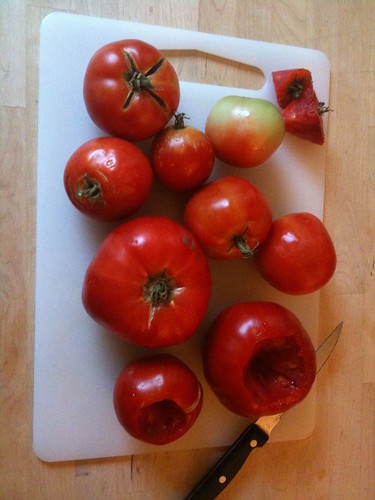
Tomatoes from the backyard garden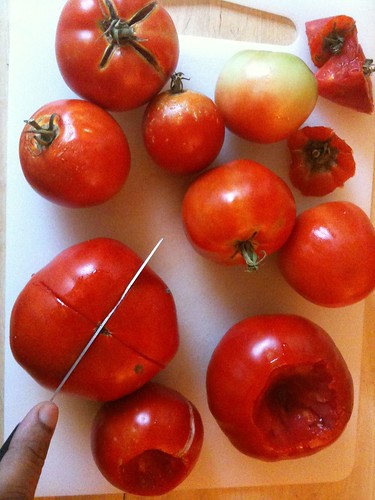
Lightly scoring the tomatoes' bottoms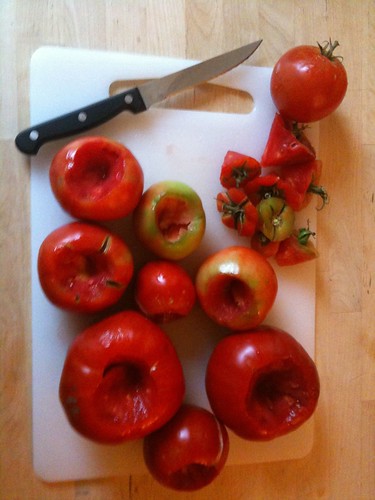
The tomatoes cored
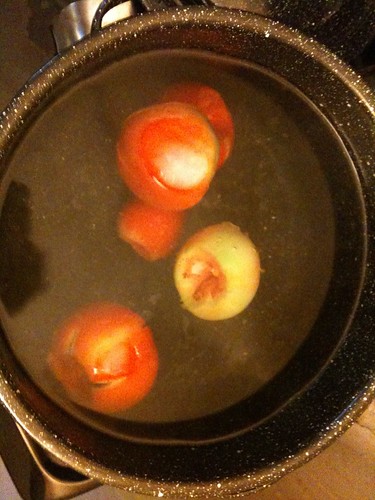
Blanching the tomatoes, part 1 (a brief boil)
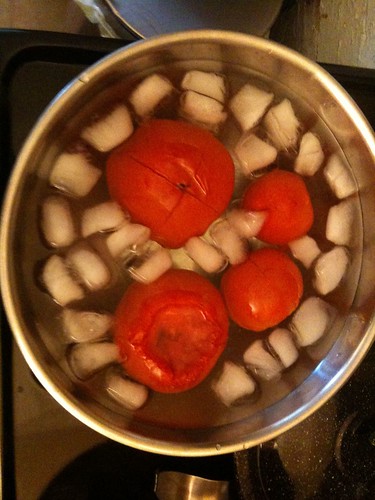
Blanching the tomatoes, part 2 (cooling in icewater)
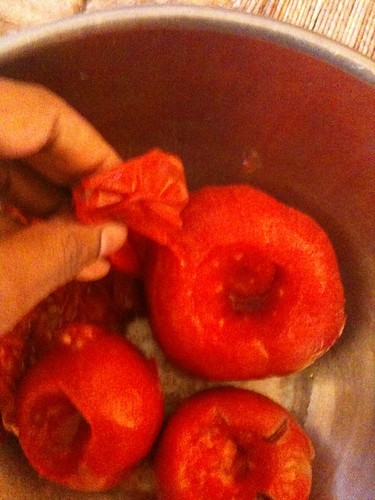
Peeling the tomatoes
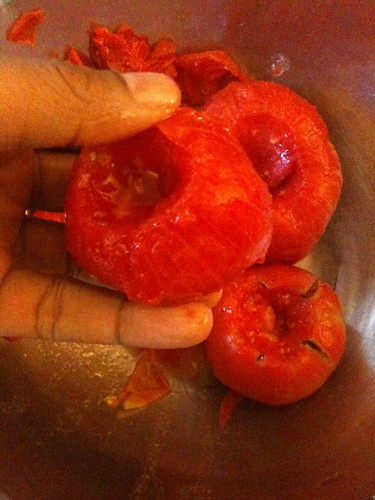
A peeled tomato
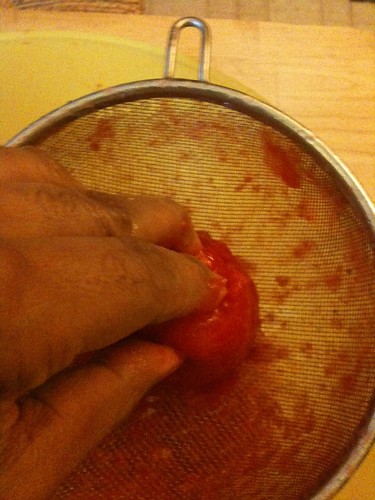
Gently seeding a tomato
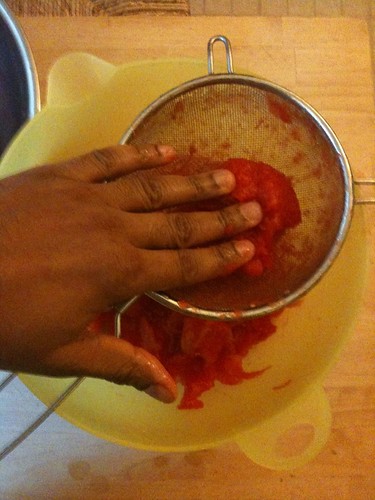
Seeding a tomato and collecting its juice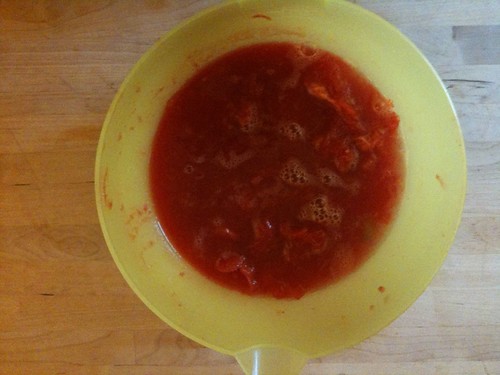
The tomatoes after being peeled and seeded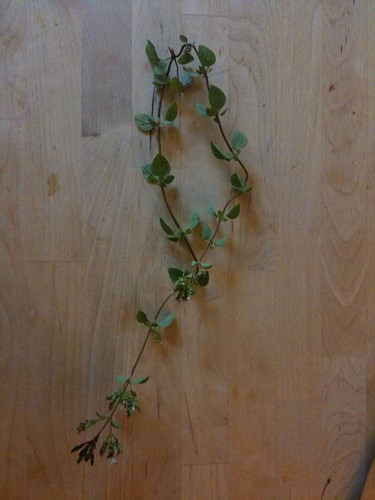
Sprig of oregano from the backyard garden
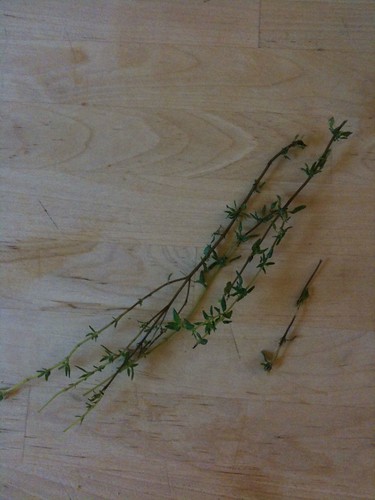
Sprig of thyme from the backyard garden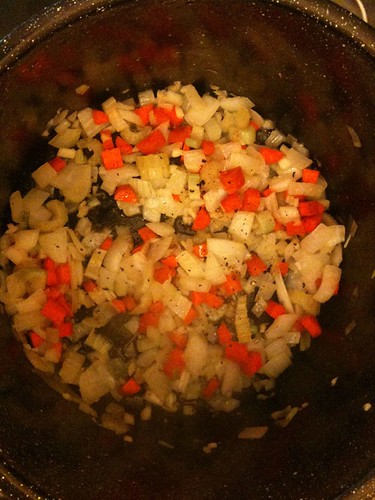
Diced vegetables (basically a mirepoix), before the tomato paste has been added
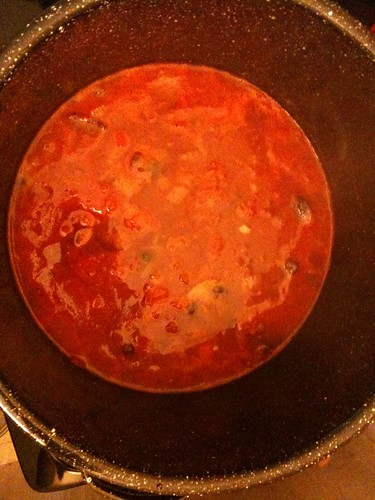
After the tomato sauce is added
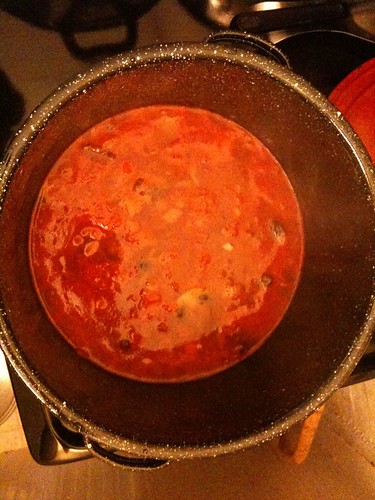
The tomato sauce cooking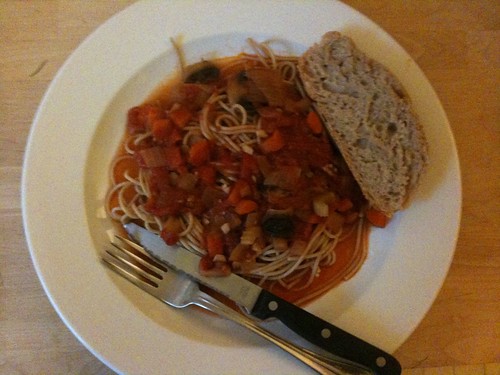 Homemade sauce with homemade baked bread
Homemade sauce with homemade baked bread
In my initial post I remarked on my amazement at being to go a week without meat; in my second, I said that I had gone weeks without it. I have now passed the year and a half mark (August 15 is about a year and 8 months to be exact), and I am happy to say that I've been able to maintain doing without meat (and processed foods in general), both in Chicago and Jersey City, and during travels here and there, with only a few exceptions (holidays like Thanksgiving; a meal at the home of a poet friend in Los Angeles, where only hamburgers--and lettuce--were available; etc.). I still don't miss meat, and I still have not gotten into tofu, seitan or meat-like substitutes, but I do like eggs, some dairy (mostly cheese), and fish and shellfish on occasion that have not decided to become a vegan. Not going the vegan route has also meant less disruption for C, though he eats less meat than he once did, even when I'm halfway across the country.
From the beginning, my shift to vegetarianism included recognizing the ethical dimensions of doing so, as a range of philosophers, critics, food writers, and others have articulated over the centuries, but those initially were less crucial than my personal desire, for health and economic reasons, to make the shift. Over the last year and a half, I've watched, as I used to with horror, the ongoing massive recalls of US meat products and produce, the increasing epidemic of obesity in this country and in rich and developing nations, and the exploding price of food in general, and feel that moving towards a vegetarian diet was the way to go. Countless revelations, in print, film and video, about the horrors of industrial meat production in the US and the West have underlined my conviction. Yet I've striven to maintain my stance of not proselytizing for or pushing my shift on anyone else, though as I mentioned, several people close to me have moved more towards this way of eating. I've kept myself in check because I realize full well that traditions and cultures of meat-eating are deeply ingrained in this society--I once bought into them--and across the West, and all the appeals anyone makes to anything beyond sheer economics, or in specialized cases to spiritual and religious traditions, will have little impact on most people's eating habits.
I also realize that we live in a time where in the US at least, many of the least nutritional foods are cheaper than basic staples, because of the structure of government subsidies of various crops and processed foods, and it continues to be the case that those with the least resources can economize, to the extent possible, by eating fast and processed foods, rather than healthier options, including a diet mostly comprising of fruits and vegetables. Such a diet also requires the added efforts of planning and cooking--with improvisation thrown in--which our society had for decades come to deprioritize, though the vogue over the last decade of food TV, foodieism and culinary education in general has reversed this to some extent. Alongside all the reality shows like Top Chef, Iron Chef, and the glut of Gordon Ramsey-related programming remystifying cooking, there have been more than enough shows guiding attentive viewers through simple, delicious meals.
I am glad I learned to cook as a child, having watched my mother and grandparents do so (my father could cook only the simplest meals, though he could barbecue anything) and having done so for most of my adulthood after college, but I have come across a large portion of people who never grew up learning how to cook and, even with the culinary vogue over the last decade, have not learned to do much beyond prepare already prepared meals. One thing that cooking vegetarian meals has done is to make me a more skillful cook in some ways, and a confident cook overall. Knowing that I'll have to whip something up that tastes good without revolving around meat means that I've had to learn new ways of cooking, combining types of foods, trying things I hadn't thought of, because I could always default to: meat + starch + vegetable or even just meat + vegetable + bread. Over the years I can attest to having assimilated many recipes and techniques, by the likes of Julia Child, Martha Stewart, Jacques Pépin, Lidia Bastianich, Rachael Ray, Paul Dean, G. Garvin and others, and then there is my Lonely Planet of cooking, Mark Bittman's How to Cook Everything, which has yet to fail me in any regard (it sits alongside cookbooks like The Joy of Cooking and by figures like Patti Labelle and institutions like Cupcake Café), but aside from a vegetarian cookbook Reggie H. provided, most vegetarian cookbooks I've seen have tended towards an older way of thinking about vegetarianism that leaves out a range of possibilities. Thus learning new techniques and improvising have proved the way to go so far. And I hope to keep going forward along these lines.
None of this is new to some of you, I know. So please indulge me. I welcome any thoughts J's Theater readers have about vegetarianism and veganism, vegetarian and vegan diets, and anything else related to this topic. I also have included a recipe for intrepid home cooks who've never made their own tomato sauce. I tried this last year, after we got a great harvest of tomatoes, and then again recently, and it was better the second time around. You can make your own marinara sauce at any time, though, using canned tomatoes, and it will taste better--and less sweet and salty--than almost any brand you buy in a jar.
HOMEMADE VEGETARIAN MARINARA SAUCE
Based on several online recipes, including author John Mariani's, and a bit of experimentation
1/2 cup olive oil
1 large white or yellow onion
5 cloves of garlic, peeled and crushed or diced
2 Tbsp fresh or dried herbs (basil, oregano, rosemary, thyme, etc.)
1/2 cup red wine
12 cups peeled and seeded tomatoes (or 2 (28 oz.) cans of crushed or chopped Italian-style tomatoes, with sauce)
2 carrots, diced
2 stalks of celery, diced
1 1/2-2 cups white mushrooms, sliced
1 teaspoon of sugar (you can skip, but add if using canned tomatoes to counteract their acidity)
salt and pepper to taste
In a large pot, heat the olive oil. Add the onions and cook slowly, till they sweat. Do not burn them, as this will affect the taste of the sauce. When the onions are translucent and soft (if yellow, they'll be golden brown), add the garlic and dried or fresh herbs (fresh herbs retain their flavor if added later, but it's okay to add them at this point), carrots, celery (and any other vegetables, like yellow squash or zucchini) and cook for 5-7 minutes. Add 1/2 cup of red wine, to deglaze the pan, and let this mixture cook for 2 minutes. Add the peeled and seeded tomatoes or canned tomatoes and their juice, and the mushrooms, and stir to combine all the ingredients. [Again, for simple marinara, you can skip the mushrooms.] Bring to a simmer, and cook on low heat, stirring occasionally for 2 hours. As the sauce is cooking, add 1 tsp. of sugar, and salt and pepper to taste. Serve with freshly cooked whole wheat pasta!
[Note that if you are making simple marinara, you can start with onions and garlic alone, skip the rest of the vegetables and the red wine, keep or remove the onions and garlic before adding the tomatoes and sauce, and just cook the vegetable-less tomatoes for 20-25 minutes. This version goes well with linguine, spaghetti or any other pasta.]
How to Peel and Seed Tomatoes
First core all the tomatoes, and gently score their bottoms with a +. This will help to pull the skin the tomatoes. When you have done this with all the tomatoes, use a slotted spoon or laden to lower them into boiling water and let them cook for 15-30 seconds. (If you drop them in you could get boiling backsplash. Not good!) Do not overcook them. Add 3-4 tomatoes at a time. After they've boiled immediately transfer them to a bowl of icewater. Do with the next set until you have blanched all the tomatoes. You should be able to peel off the skins with ease. Next, using a strainer over a bowl, split the tomatoes apart with your fingers, and gently rub them against the inside of the strainer to remove as many of the seeds as you can. The juice will run into the bowl, and you can place the seeded tomato right into the bowl as well. After you've collected the seeds, dump them on a paper towl or bowl (you can save them if you want to plant tomatoes for next year!), and proceed until you have completely seeded all the tomatoes. You should have a bowl of tomato sauce and pulp, with no skin and no seeds when you're done.
Photos

Tomatoes from the backyard garden

Lightly scoring the tomatoes' bottoms

The tomatoes cored

Blanching the tomatoes, part 1 (a brief boil)

Blanching the tomatoes, part 2 (cooling in icewater)

Peeling the tomatoes

A peeled tomato

Gently seeding a tomato

Seeding a tomato and collecting its juice

The tomatoes after being peeled and seeded

Sprig of oregano from the backyard garden

Sprig of thyme from the backyard garden

Diced vegetables (basically a mirepoix), before the tomato paste has been added

After the tomato sauce is added

The tomato sauce cooking
 Homemade sauce with homemade baked bread
Homemade sauce with homemade baked bread









Wow. Look at those beautiful tomatoes! Thanks for the step-by-step, some of us need that. Great recipe. Where's my invitation? I want my marinara NOW!
ReplyDeleteI need to add some good vegetarian meals (and sauces) to my repetoire. I am certainly guilty of being meat reliant. This recipe looks delicious!
ReplyDelete